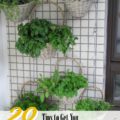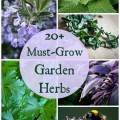June 21-30 is Herbal Medicine Week. Herbs have been used in the traditional medical systems of many different civilizations for thousands of years. Medicinal herbs are perfect for treating everyday ailments at home, and many medicinal herbs grow well in your own herb garden. Herbs are especially helpful as preventative medicine: herbs can build the body’s immunity and they also increase the body’s ability to adapt to life’s stresses. Rosemary Gladstar’s Herbal Recipes for Vibrant Health: 175 Teas, Tonics, Oils, Salves, Tinctures, and Other Natural Remedies for the Entire Family points out that herbs are very helpful in most non-emergency medical situations, such as colds, low-grade fevers, bruises, cuts, inflammation and burns.

Here’s how to get started using herbs as home remedies. This article is not intended to replace medical advice, it simply contains a few suggestions for using herbs to treat everyday ailments. Always consult a medical practitioner in emergencies and severe illnesses.
Herb Teas, Herbal Infusions and Decoctions
Drinking herbal tea is the easiest way to benefit from the medicinal properties of many common herbs. Many medicinal herbs are available as loose tea or in tea bags: when you’re pressed for time, try these Five Herbal Teas for Everyday Health or make your own teas with herbs from the garden.
An herbal infusion is generally stronger than a tea. You can make your own herbal infusions using fresh herbs or dried herbs; here is a guide on How to Make an Herbal Infusion.
When using roots or barks with medicinal properties, a decoction is made by boiling the root or the bark in water. Add approximately one or two teaspoons of the root or bark for each 1.5 cups of water, boil the mix in a saucepan, cover and simmer for about ten minutes, let the decoction cool down and then strain it.
Herbal Salves
Herbal salves are used for muscle aches and pains, bumps and bruises, dry skin and other skin problems, coughs or colds…Herbal salves or lotions are easy to make: try this recipe for Dandelion Infused Lotion and then use the basic recipe with your chosen medicinal herbs.
Herbal Baths
Herbal baths are a very enjoyable way to use herbs at home. Place herbs in small muslin bags, or tie them into a bunch and hang under the hot water tap as you run the bath. Try rosemary, lavender or marjoram for a bath that releases muscle tension, or lavender or chamomile for a relaxing evening bath. How to Use Herbs in a Bath has more suggestions.
Herbal Facial Steams
An herbal facial steam is a natural home beauty treatment with many health benefits. Herbal steams soften the skin, unclog the pores, stimulate circulation and eliminate toxins. Read Cleanse Your Skin with an Herbal Facial Steam for tips on choosing herbs for your facial steam and step-by-step instructions.
My two most favorite books on growing and using herbs, including medicinal herbs, are:
Bremness, Lesley: The Complete Book of Herbs: A Practical Guide to Growing and Using Herbs (Studio, 1994)
Gladstar, Rosemary: Rosemary Gladstar’s Herbal Recipes for Vibrant Health (Storey Publishing, 2008)








